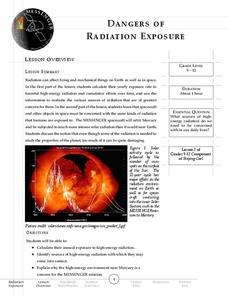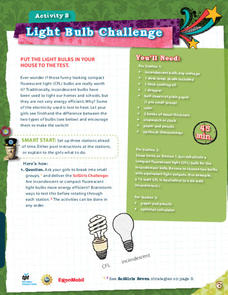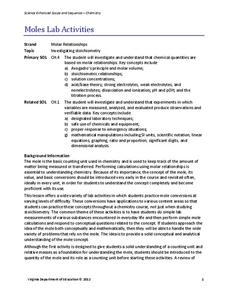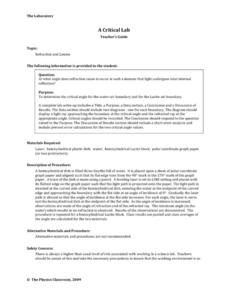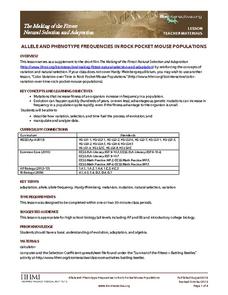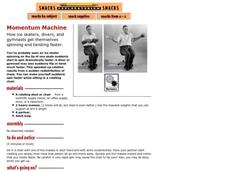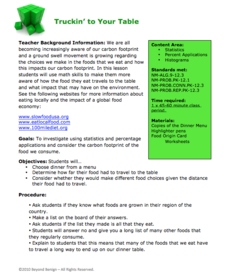Teach Engineering
Density Column Lab - Part 1
Mass and density — aren't they the same thing? This activity has groups use balance beams and water displacement to measure several objects. The pupils use the measurements to calculate the density of the objects.
Kenan Fellows
How Much Heat Can a Phase Change Produce?
Scholars learn about heat release in phase changes. They perform calculations as they compare and contrast a science fiction passage and a home heating application.
Learning Games Lab
Cattle Feeding
Finding a balance between too much protein and not enough doesn't have to be a guessing game. Young scientists use an interactive lesson to learn how to calculate protein content in cattle feed and how to mix feed to create the ideal...
Messenger Education
Dangers of Radiation Exposure
Gamma radiation, which is harmful, is useful in treating cancers. In the second lesson in a series of four, young scientists take surveys and calculate their yearly exposure to ionizing radiation. Then they read about how harmful their...
Howard Hughes Medical Institute
DNA Profiling Activity
Everyone loves a good mystery ... can your class actually solve one? Partnered pupils take on the role of forensic investigators during a three-part activity focusing on DNA evidence processing. Learners discover the methods used to...
Teach Engineering
Creepy Silly Putty
It might be silly to determine the creep rate of putty but groups will enjoy making different formulations of silly putty and playing with them to understand how the different mixtures behave. The second part of the activity has groups...
Project WET Foundation
The Blue Planet
What a neat interactive that interacts with the amount of water on Earth's surface. It begins with a brief audio introduction of the Blue Planet and how it got its name. Then, users click on the activity to play a game...
Teach Engineering
Building a Piezoelectric Generator
In pairs, learners build a piezoelectric generator from readily available electric components in the second and final installment of the two-part series. Tapping the piezoelectric element produces enough electricity to light an LED....
PBS
Light Bulb Challenge
Efficiency equals money where homes are concerned. A comparative lesson asks learners to measure heat output of incandescent and compact fluorescent light bulbs. They follow their investigation with calculating the cost of using the two...
NOAA
Through Robot Eyes
How do robots assist ocean explorers in collecting data and images? The final installment in a five-part series has science scholars examine underwater images collected by robots and identify the organisms shown. Groups then calculate...
Howard Hughes Medical Institute
The Great Elephant Census Modeling Activity
They say elephants never forget—and your class won't forget an insightful modeling activity either! Junior zoologists take part in a mock elephant census using the sample count and total count methods. The included materials provide...
Curated OER
Moles Lab Activities
General chemistry class members engage in a mini-unit on mole conversions. Through nine lab activites with varying degrees of difficulty, they practice measuring mass and volume, molar calculations, and stoichiometry. Terrific...
Physics Classroom
A Critical Lab
Physics lab groups finagle with laser lights to determine the critical angle of refraction for both water and Lucite. Because there are no detailed steps or an answer key for this enlightening exercise, an inexperienced physics...
Berkshire Museum
Adopt a Schoolyard Tree
Help young scientists connect with nature and learn about trees with a fun life science lesson plan. Heading out into the school yard, children choose a tree to adopt, taking measurements, writing descriptions, and drawing sketches of it...
Curated OER
Math Can Be Electrifying
Students explore how math can be used to calculate and analyze how electricity causes air pollution. Students design a campaign to educate family members on ways they can save electricity. They create a graph that compares two electric...
American Chemical Society
The Energy Efficiency of Heating Water
Can a small change in laboratory procedures save energy? Scholars test three different methods for heating water in a science lab. Then, they calculate the energy efficiency for each and compare them to determine which uses the least...
Curated OER
Allele and Phenotype Frequencies in Rock Pocket Mouse Populations
In the deserts of Arizona and New Mexico, some tiny creatures show just how quickly natural selection can turn a mutation into an advantageous adaptation. Watch a video about rock pocket mice, who show that one small change can make all...
National Wildlife Federation
Lights, Camera, Action! Conducting an Energy Audit
Thirty percent of energy used by schools is used inefficiently! Part two in the series of 12 has groups perform energy audits of their schools as part of the Cool Schools Challenge. Each group is assigned a specific room, performs the...
Exploratorium
Momentum Machine
If you have a rotating office chair in your classroom, you can have physics pupils participate in this simple, yet effective demonstration of angular momentum. One partner sits in the chair, arms outstretched, holding heavy weights. The...
American Chemical Society
Exothermic, Endothermic, and Chemical Change
Scientists can't observe bonds breaking or forming, so how do they distinguish between exothermic and endothermic reactions? Young scholars complete two experiments to do just that. They monitor temperature change and calculate the...
Pingry School
Solubility Product of an Ionic Compound
How do scientists determine when a solution is fully saturated? Scholars address the topic as they observe patterns of precipitation in various concentrations of ions. Using a well plate, pipette, and common chemicals, they collect data...
Curated OER
Calculating Black Hole Power
In this black hole learning exercise, students use a given equation that relates the rate of matter falling into a black hole to the power emitted by the black hole to determine accreted mass.
Beyond Benign
Truckin’ to Your Table
Food takes a trip to the table. Class members choose a meal from a menu and calculate the total cost of the meal including tax and tip. Using a food origin card, pupils determine how far each of the ingredients of a meal traveled to end...
Curated OER
Vector Lab
Here is a math lab that helps young mathematicians understand the real-life meaning for vector addition. By building a model using spring scales and washers as weight, and then calculating the vector addition using two different methods,...



